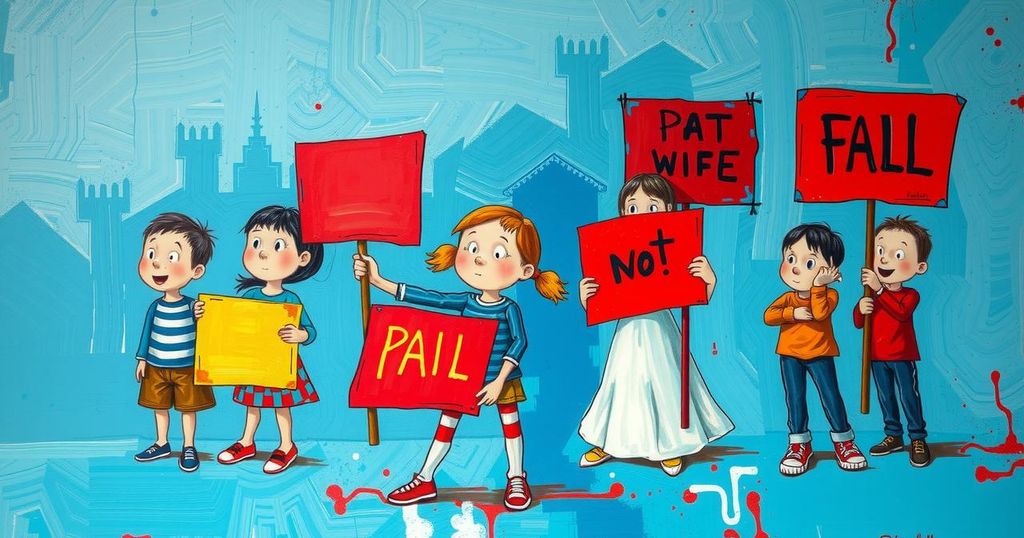World news
ASIA, BIDEN ADMINISTRATION, CONGRESS, DONALD TRUMP, EAST ROOM OF THE WHITE HOUSE, ENERGY INFRASTRUCTURE, FEDERAL DEPARTMENT, HOUSE, JAPAN, KA, LINDA MCMAHON, NATIONAL SECURITY, NORTH AMERICA, NORTH KOREA, POLITICS, THE MIRROR US, TRUMP, TRUMP ADMINISTRATION, U.S. ELECTIONS, UNITED STATES, US DEPARTMENT OF EDUCATION, USA, WHITE HOUSE
Marisol Gonzalez
0 Comments
Trump’s Executive Order on Education Sparks Controversy and Alarm
President Trump’s recent executive order to dismantle the Department of Education has sparked outrage due to alarming comparisons with North Korean tactics. While supporters argue it promotes local control, critics warn it will harm vulnerable students. Legislative and legal challenges are expected as both sides mobilize in response.
President Donald Trump’s recent executive order aimed at dismantling the Department of Education has incited widespread controversy and drawn alarming similarities to North Korean methodologies. Following a storm of criticism across social media, Trump confirmed the executive action to significantly reduce the department’s scope.
Various social media commentators reacted sharply, with one user stating: “Kids brought into the White House to provide a ringing chorus as Trump abolishes the US Department of Education,” highlighting what they perceive as a disturbing shift toward authoritarian governance. Another user condemned the action, asserting, “Donald Trump is using kids as a prop as he proudly signs an unconstitutional executive order abolishing the Department of Education. Our kids deserve better.”
While Congress traditionally holds authority over the federal department, Trump’s executive order raises concerns for potential legislative dissolution. The signing event occurred in a White House East Room that was temporarily set up like a classroom where children engaged in activities such as signing their own mock ‘executive orders.’
Under the new directive, Education Secretary Linda McMahon has been instructed to implement substantial cuts to the Department of Education, with considerations for its complete shutdown. Despite these drastic changes, press secretary Karoline Leavitt reassured that essential functions, including the oversight of federal student loans and Pell grants, would persist.
However, Leavitt emphasized, “The great responsibility of educating our nation’s students will return to the states,” signaling a significant shift in educational governance. Public education advocates express deep concerns that the dissolution of federal oversight may adversely affect vulnerable communities disproportionately reliant on federal support.
NAACP President Derrick Johnson raised alarms, stating, “This is a dark day for the millions of American children who depend on federal funding for a quality education, including those in poor and rural communities with parents who voted for Trump.”
Democratic leaders are preparing to contest the executive order both judicially and legislatively, describing it as “dangerous and illegal,” with adverse implications for low-income and diverse student populations. Rep. Bobby Scott of Virginia, a key figure in the House Committee on Education and the Workforce, cited the department’s historical role in safeguarding civil rights among students.
Conversely, proponents of Trump’s initiatives, such as Tiffany Justice from Moms for Liberty, voiced strong support for the actions, asserting that it would eliminate inefficiencies in education and allow for more tailored solutions. “No more bloated bureaucracy dictating what kids learn or stifling innovation with red tape,” she proclaimed, suggesting that local entities will now have the opportunity to facilitate educational improvements.
In summary, President Trump’s executive order to dissolve the Department of Education has sparked significant controversy, with opponents citing potential harm to vulnerable student populations. Critics warn that the move reminisces authoritarian tactics while supporters argue for localized control of education. The future landscape of educational governance remains uncertain as both sides prepare for political and legal battles surrounding this initiative.
Original Source: www.express.co.uk




Post Comment